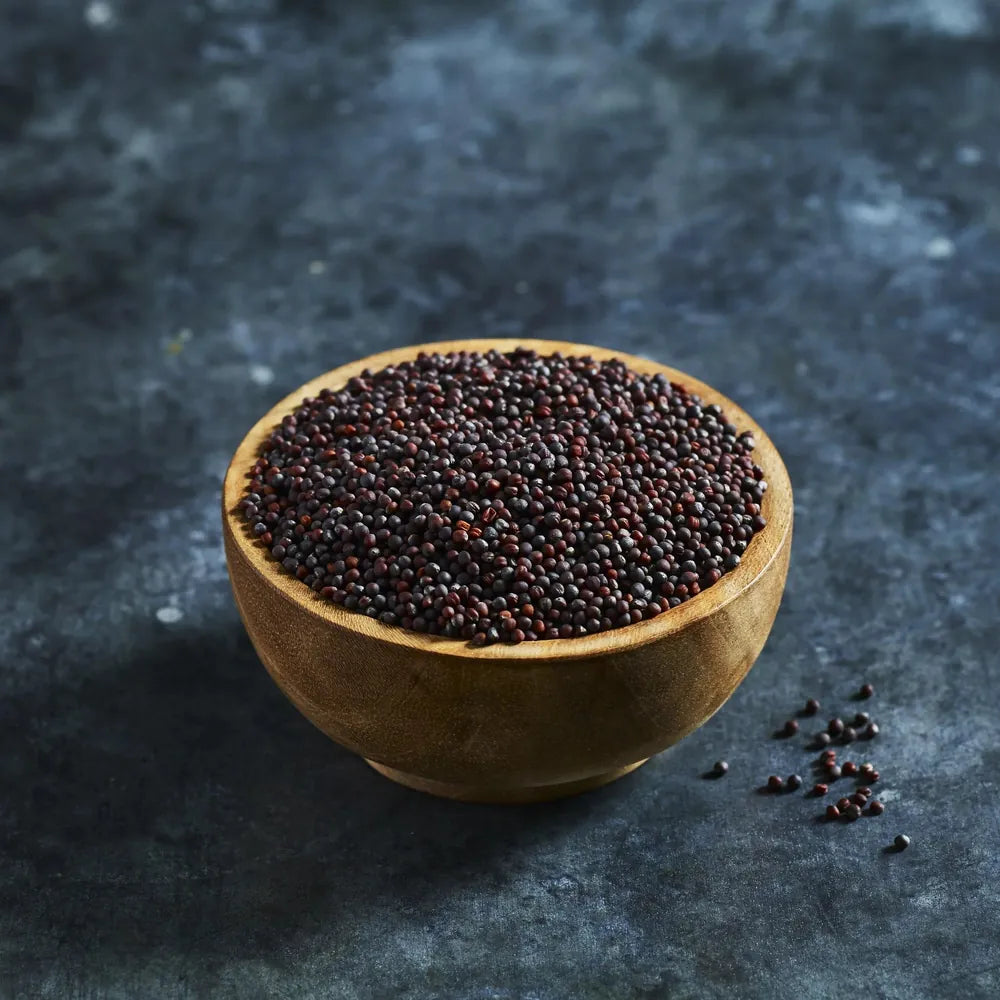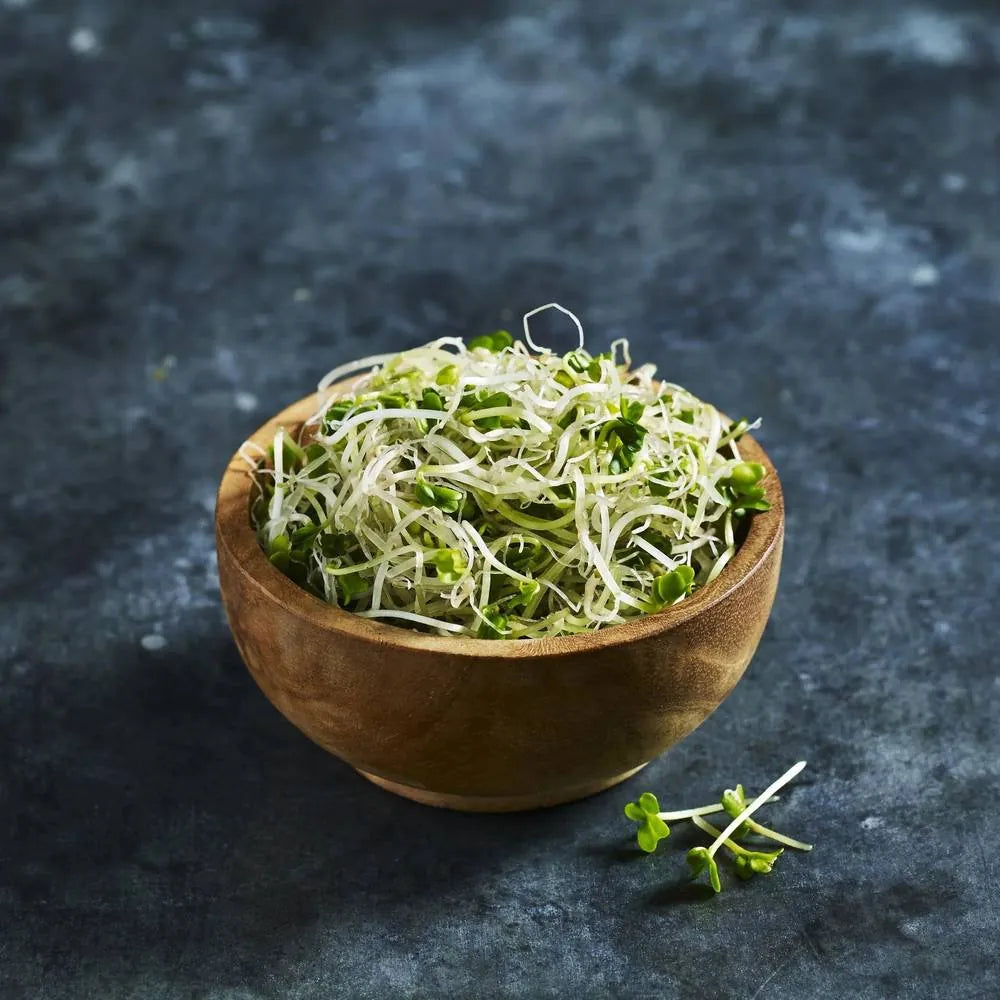Broccoli Seeds – Sprouting
-
Brassica oleracea var. italica
- Seed Status – Untreated, non-GMO, high-germination
- Thousand Seeds Weight – 2.3 grams
- Soak Time – 4 Hours
- Time to Harvest – Ready in 5–6 days
- Nutritional Profile – Rich in vitamins A, C, and K, antioxidants, and sulforaphane
- Flavour – Mild, slightly peppery taste
- Mixing Options – Can be grown solo or mixed with alfalfa, radish, or clover seeds
We Offer Two Premium Varieties
- Type 1 – New Zealand-Grown Calabrese Seeds: A sought-after variety with a 95% germination rate, known for excellent performance.
- Type 2 – Australian-Grown Green Sprouting Seeds: A robust, reliable variety with a 95% germination rate, and your chance to support Aussie farmers.
Grow Fresh Broccoli Sprouts at Home
Grow vibrant, nutrient-packed broccoli sprouts with our premium Broccoli Seeds for Sprouting. Perfect for year-round sprouting, these seeds produce crisp, peppery broccoli sprouts rich in sulforaphane—one of nature’s most powerful antioxidants. Enjoy fresher flavour and higher nutrition than supermarket greens, right from your kitchen.
How to Grow Broccoli Sprouts
Sprouting broccoli seeds is simple, space-friendly, and rewarding. You’ll only need a jar and a few minutes each day — in under a week, you’ll have fresh, peppery sprouts ready to eat. Here’s how:
- Soak: Place seeds in a sprouting jar and soak for 4 hours. They’ll absorb water and kick-start germination.
- Drain & Rinse: After soaking, drain well and rinse thoroughly. Good drainage is key to preventing mould.
- Repeat Rinsing: Rinse 2–4 times daily (morning & evening minimum). Keep the jar tilted to allow excess water to drain and air to circulate.
- Growth: Within 4–5 days, sprouts will be ready. A little white fuzz is normal root hairs, not mould.
Grow Broccoli Sprouts With Clover, Radish And Alfalfa
Broccoli sprouts pair beautifully with red clover, radish, and alfalfa because they share the same growth cycle (ready in 4–6 days). Together, they create a colourful, nutrient-dense mix:
- Broccoli: Mild, peppery crunch
- Clover: Fresh, slightly sweet taste
- Radish: Bold, spicy kick
- Alfalfa: Light, delicate texture
Try growing them together for a balanced sprout blend that’s perfect in salads, wraps, smoothies, and sandwiches. For full instructions, see our How to Grow Leafy Sprouts Guide.
Essential Tools: Sprouting Jars & Kits
Using the right tools makes sprouting broccoli seeds easier and more efficient:
- Sprouting Jars: Designed for proper drainage and airflow, making daily rinsing easy.
- Broccoli Sprout Kit: Perfect for beginners — includes 2 glass seed sprouters and 1 kg of broccoli seeds for just $69.90.
- Bulk Seeds: For regular sprouters, buying in bulk is the most economical way to keep a steady supply.
👉 Want more detail? Head to our Broccoli Sprout Complete Guide and watch expert Rhonda Patrick show you how its done.
Why Grow Broccoli Sprouts?
Broccoli sprouts are the sulforaphane superstar of sprouting. Sulforaphane is a potent antioxidant that supports overall wellbeing. Home-grown sprouts are the easiest way to access this goodness, delivering far more sulforaphane than mature broccoli florets. Learn more about sulforaphane in our broccoli sprout guide, which covers everything you need to know about broccoli sprouts, including handy little tips that you really should know.
Ways To Consume Broccoli Sprouts
Fresh broccoli sprouts can seriously be added to almost any meal. They’re good on their own as well—fresh, crunchy, peppery and extremely healthy stuff. Here are a few ideas for you:
- Add to salads and grain bowls for extra crunch and nutrition
- Layer into sandwiches & wraps for flavour and texture
- Blend into smoothies & juices for a green boost
- Top avocado toast for a quick, nutrient-dense finish
- In soups, with steaks, on a pizza! I’ve tried it all!
Why Buy Broccoli Sprouting Seeds in Bulk?
Buying broccoli sprouting seeds in bulk is the smartest choice for regular sprouters, resellers and commercial growers. Not only do you save money, but you also secure a reliable supply of premium-quality seeds. Here are some things to consider:
- Lower Cost Per Kilogram – Bulk buying significantly reduces your cost compared to small packets, making it the best option for frequent sprouters.
- Fewer Reorders & Reduced Shipping Costs – Keep your pantry stocked and save time and money on repeat orders.
- Convenient & Reliable Supply – Always have seeds on hand for sprouting, juicing, or mixing into your favourite sprout blends.
- Best Quality at the Best Price – Our broccoli sprouting seeds are among the highest quality available in Australia, with excellent germination rates. If you happen to find the same quality cheaper elsewhere, we’ll match it—guaranteed.
- Bulk Quantities Available – From practical 20kg bags to large-scale pellet supply, we meet the needs of Australian home sprouters, resellers and commercial growers all over the country.
Live Rates – Weight & Destination Based
Shipping is automatically calculated at checkout based on your order’s weight and delivery address. We use real-time rates from Australia Post and other carriers to provide the most accurate cost.
Handling Time
Orders are packed and dispatched within 0–2 business days (Monday–Friday).
Estimated Delivery Time
Transit times depend on your location:
• Metro areas: usually 2–3 business days
• Regional/rural areas: 5–10 business days
• WA & TAS: may take longer due to state biosecurity inspections
Tracking
All orders include tracking. You’ll receive an email with your tracking link once your parcel has shipped.
Authority to Leave (ATL)
Couriers may leave parcels in a safe place if you are not home. Please provide delivery instructions at checkout if you prefer otherwise.
Pickup Option (Riverstone, NSW)
Please place your order on our website and select “Pick up” at checkout. Wait for us to contact you to confirm and arrange a pickup time. Do not come to our warehouse without an appointment — pickups are strictly by arrangement only. Allow 2–3 business days for preparation; we’ll notify you when your order is ready.
Biosecurity (WA & TAS)
Certain seeds are restricted under state biosecurity laws. Customers are responsible for ensuring products comply with local regulations. Please check with the WA Department of Primary Industries and Regional Development or the Tasmanian Department of Natural Resources and Environment before ordering.
For the full details, see our Shipping Policy.
No Change-of-Mind Returns
We do not accept returns or refunds for change-of-mind purchases.
No Exchanges
We do not accept product exchanges. All sales are final unless covered by Australian Consumer Law.
Your Rights Under Australian Consumer Law
Your ACL rights still apply. You’re entitled to a refund or replacement if your item is faulty, misdescribed, or incorrect. Please contact us within 7 days of delivery with your order number and photos if applicable. Once approved, we will provide a prepaid return label and process a refund or replacement. Refunds are issued to your original payment method within 10 business days.
90-Day Seed Germination Guarantee
If your seeds fail to germinate within 90 days of purchase, we will re-test the batch. If our test confirms poor germination, we will provide a refund or replacement. Seeds must be stored and used according to our instructions; please retain packaging or batch details if available.
For the full policy text you can also see our policy page at /policies/refund-policy.
Seed FAQ
Seeds don't expire, but their ability to sprout weakens over time. With proper storage, your seeds will remain viable for years, ensuring a high germination rate for every batch of fresh sprouts.
Key Storage Tips:
- ✅ Keep it Cool, Dry, and Dark: The best place to store seeds is in a location that's away from heat, light, and humidity.
- ✅ Use an Airtight Container: Jars or sealed bags are ideal. For extra protection against moisture, you can add a silica gel packet.
- ✅ Consider Refrigeration: For long-term storage, keeping seeds in the fridge or freezer is a great option. Just be sure to let them return to room temperature before you use them.
Sprouting Seed Viability Guide
Here's how long you can expect some of our most popular seeds to last when stored correctly:
- 1–2 Years: Mung beans, peas, lentils, and chickpeas.
- 3–4 Years: Alfalfa, radish, fenugreek, and mustard.
- 4–5 Years: Broccoli, wheatgrass, sunflower, buckwheat, and clover.
If you're unsure about older seeds, you can perform a simple germination test. Place a few seeds on a damp paper towel inside a sealed bag. Keep them moist and check the number of sprouts after 5–10 days to see if they are still viable.


